|
|
Modal Verbs printable
worksheets, powerpoints and online exercises
order results:
most downloaded first
-
newest first
|
Worksheets |
Powerpoints |
Online exercises |
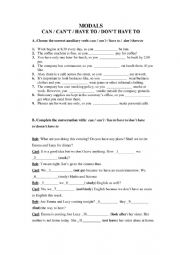
modals
Level: intermediate
Age: 13-17
Type:
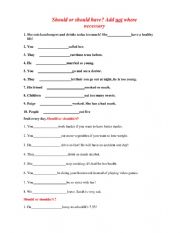
Grammar practice. Should
Use should or should have in sentences.
Level: intermediate
Age: 9-100
Type:
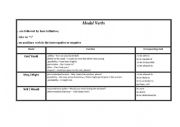
Modal Verbs - explanation
I believe it�s a useful summary of the use and function of each modal.
Level: intermediate
Age: 13-100
Type:
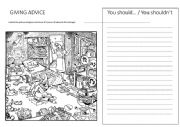
GIVING ADVICE - A MESSY TEENAGER
The pupils give as many pieces of advice as possible to help the teenage girl.
Level: intermediate
Age: 10-100
Type:

Text Comrehension
A text that can be use for working with MODALS
Level: intermediate
Age: 12-100
Type:

MODAL VERBS
MODAL VERBS EXERCISES
Level: elementary
Age: 13-100
Type:
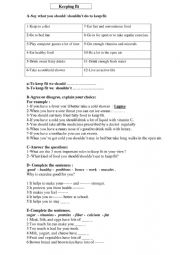
stay healthy
stay healthy
Level: intermediate
Age: 15-100
Type:
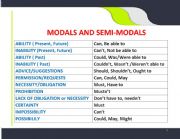
Modals and Semi-Modals
Table with modal and semi-modal verbs
Level: intermediate
Age: 13-100
Type:

Games and hobbies
Level: elementary
Age: 9-11
Type:

Should or shouldn�t
Modal verb exercise: should and shouldn�t
Level: elementary
Age: 9-11
Type:
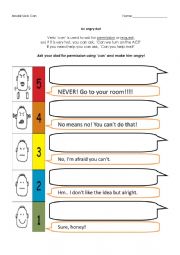
Angry Dad - Modal Verb (Can)
This worksheet is targeted for the students that are learning the modal verb �can�. Piss this dad off by asking annoying questions using can.
Level: elementary
Age: 6-100
Type:
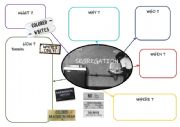
Segregation USA
A blank mind map to fill in with students to review the lesson about Segregation before test.
Level: intermediate
Age: 14-16
Type:

Can
Level: elementary
Age: 8-12
Type:

Noisy Neighbours role play cards 3 pairs
Read your role card in pairs. Write a script - Teacher corrects it and checks pronunciation and students act it out. They must reach a reasonable compromise. Complaining students must start inquiring about the neighbour�s health and then carefully introduce the issue with statements like: "I�ve noticed..." "I was wondering if...", "I understand...
Level: intermediate
Age: 18-100
Type:

Shuuld or Shouldn�t
Level: elementary
Age: 10-12
Type:
|

Lost at Sea
Conversation Activity which students are lost at sea, in a small boat, and they have to choose who they�re going to eat. They have to explain why they shouldn�t eat each one and give arguments.
Level: intermediate
Age: 14-100
Format: PowerPoint

FUTURE WILL
USE OF FUTURE WILL
Level: intermedio
Age: 12-16
Format: PowerPoint

Modal verbs : Can and could
the use of the modal verbs can and could
Level: elementary
Age: 7-12
Format: PowerPoint

ALOUD TO
SLIDES PROVIDING SITUATIONS WHERE THE STUDENTS HAVE TO USE THE FORM "ALOUD TO" OR "NOT ALLOWED TO" TO COMMUNICATE THEIR IDEAS.
Level: intermediate
Age: 14-100
Format: PowerPoint

ABILITIES
Some sentences about abilities / modal can
Level: elementary
Age: 7-100
Format: PowerPoint

Can & Can�t
It presents in a simple way the modals can and can�t with a small dialog in the end.
Level: elementary
Age: 18-100
Format: PowerPoint

Modals of Speculation
This is a very simple way to explain Modals of Speculation. It contains the grammar guide, examples and exercises. Enjoy!!
Level: advanced
Age: 14-100
Format: PowerPoint

Can I and May I: Modals practice
This worksheet has two parts. Part 1 has a bunch of modal sentences scrambled and the student must unscramble them correctly. The second part focuses on error correction. There are sentences with errors and the students must rewrite the sentences correctly.
Level: elementary
Age: 7-12
Format: PowerPoint

What should Tim eat?
In this story, kids will help Tim to decide what he should eat. It�s useful to talk about healthy/unhealthy food, should/shouldn�t... It can also be related to sports and routines.
Level: elementary
Age: 7-10
Format: PowerPoint

Healthy Living
tips to have a healthy life
Level: advanced
Age: 18-100
Format: PowerPoint

Modals of deduction
This is a nice presentation that would help you introduce the different modals of deduction and their structure.
Level: advanced
Age: 13-17
Format: PowerPoint

Modal Verbs with Passive
Modal Verbs with Passive. Some exercises for practice with keys.
Level: intermediate
Age: 10-100
Format: PowerPoint

Modal verbs.Speaking.
This ppt can be used in a team work for contests in making sentences or questions. Which team is able to create more sentences. It is helpful and funny.
Level: intermediate
Age: 10-100
Format: PowerPoint

can acn�t
Students learn how to conjugate the model can using question, affirmative and negative forms. Then, students, in pairs, look at the slideshows and practice questions and short answers with can depending on the action. Verbs are provided
Level: elementary
Age: 6-100
Format: PowerPoint

Freetime activities
This is a poster with free time activities and sports. Based on the presentation of using modal verb can/can�t for expressing ability. Include sports, outdoor activities, sport games, playing musical instruments. Can be used as flash cards or printout for learning new vocabulary.
Level: elementary
Age: 5-12
Format: PowerPoint
|
|
Page:
[<<
previous ]
1
2
3
4
5
6
7
8
9
10
11
12
13
14
15
16
17
18
19
20
21
22
23
24
25
26
27
28
29
30
31
32
33
34
35
36
37
38
39
40
41
42
43
44
45
46
47
48
49
50
51
52
53
54
55
56
57
58
59
60
61
62
63
64
65
66
67
68
69
70
71
72
73
74
75
76
77
78
79
80
81
82
83
84
85
86
87
88
89
90
91
92
93
94
95
96
97
98
99
100
101
102
103
104
105
106
107
108
109
110
111
112
113
114
115
116
117
118
119
120
121
122
123
124
125
126
127
128
129
130
131
132
133
134
135
136
137
138
139
140
141
142
143
144
145
146
147
148
149
150
151
152
153
154
155
156
157
158
159
160
161
162
163
164
165
166
167
168
169
170
171
172
173
174
175
176
177
178
179
180
181
182
183
184
185
186
187
188
189
190
191
192
193
194
195
196
197
198
199
200
201
202
203
204
205
206
207
208
209
210
211
212
213
214
215
216
217
218
219
220
221
222
223
224
225
226
227
228
229
230
231
232
233
234
235
236
237
238
239
240
241
242
243
244
245
246
247
248
249
250
251
252
253
254
255
256
257
258
259
260
261
262
263
264
265
266
267
268
269
270
271
272
273
274
275
276
277
278
279
280
281
282
283
284
285
286
287
288
289
290
291
292
293
294
295
296
297
298
299
300
301
302
303
304
305
306
307
308
309
310
311
312
313
314
315
316
317
318
319
320
321
322
323
324
325
326
327
328
329
330
331
332
333
334
335
336
337
338
339
340
341
342
343
344
345
346
347
348
349
350
351
352
353
354
355
356
357
358
359
360
361
362
363
364
365
366
367
368
369
370
371
372
373
374
375
376
377
378
379
380
381
382
383
384
385
386
387
388
389
390
391
392
393
394
395
396
397
398
399
400
401
402
403
404
405
406
407
408
409
410
411
412
413
414
415
416
417
418
419
420
421
422
423
424
425
426
427
428
429
430
431
432
433
434
435
436
437
438
439
440
441
442
443
444
445
446
447
448
449
450
451
452
453
454
455
456
457
458
459
460
461
462
463
464
465
466
467
468
469
470
471
472
473
474
475
476
477
478
479
480
481
482
483
484
485
486
487
488
489
490
491
492
493
494
495
496
497
498
499
500
501
502
503
504
505
506
507
508
509
510
511
512
513
514
515
516
517
518
519
520
521
522
523
524
525
526
527
528
529
530
531
532
533
534
535
536
537
538
539
540
541
542
543
544
545
546
547
548
549
550
551
552
553
554
555
556
557
558
559
560
561
562
563
564
565
566
567
568
569
570
571
572
573
574
575
576
577
578
579
580
581
582
583
584
585
586
[
Next
>>]
|

Live Worksheets
Worksheets that listen.
Worksheets that speak.
Worksheets that motivate students.
Worksheets that save paper, ink and time.
Advertise here
|